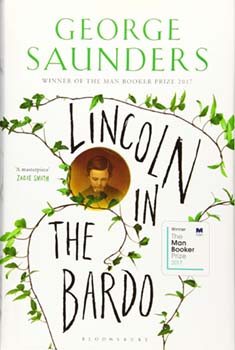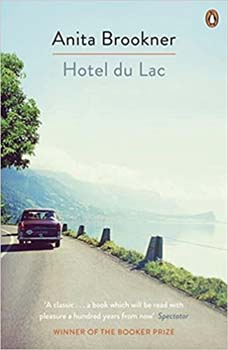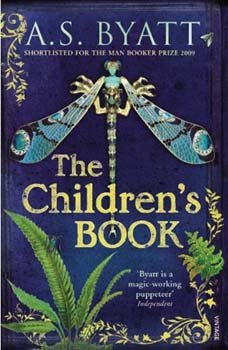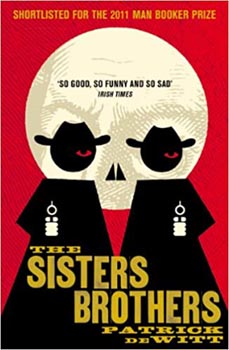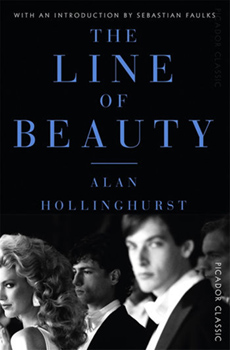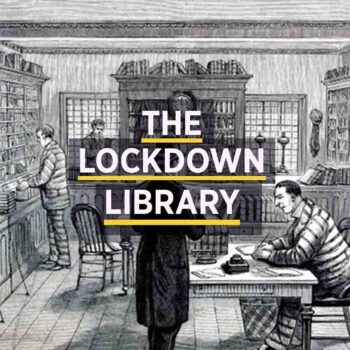Looking for the best Booker books? We pick our favourites from the past 50+ years of the prize (plus a few to avoid).
Reading for our 2020 Booker Prize episode got us thinking about Booker winners in general. Douglas Stuart’s Shuggie Bain was our pick to win and gratifyingly the judges agreed with us. It’s marvellous. Heartbreaking and humorous. A portrait of a child’s relationship with his mother unlike any we’ve encountered in literature before. Definitely one of the best Booker books, but what are the others? What are the Booker books not to miss? And which should you skip? While Shuggie Bain enters a canon of considerable stature, there’s no doubt there have been some hits and misses over the years.
We’ve picked out eight Booker-winning (or shortlisted) books we love, and – because we couldn’t resist – the four we don’t.
The Booker Prize as literary time travel
It turns out that seeking out the best Booker-Prize books is a very agreeable form of literary time travel, from recent favourites discussed on the show like Milkman by Anna Burns and The Sellout by Paul Beatty to those prize winners that have already faded from memory. Remember Life of Pi by Yann Martel? Reading The English Patient by Michael Ondaatje (before the film came out and everyone read it)? The Remains of the Day and The Famished Road? What about wading through all that Victorian poetry in Possession? Maybe you’re even one of the few who’ve read P.H. Newby’s Something To Answer For, the first ever Booker Prize winner from 1969. And if you haven’t, read on…
The best Booker Prize books (according to us)
In this spirit of reflection, we bring you our entirely subjective list of the best Booker Prize books, including a couple of contributions from Phil Chaffee, who joined us on our Booker Prize show.
Lincoln in the Bardo by George Saunders
Be warned that beginning this novel is a disconcerting experience and you may be tempted to snap it shut in exasperation. Reader, stick with it, because once you get used to the style, and get to know the characters who narrate the story, you are in for a treat. Lincoln in the Bardo tells the story of President Abraham Lincoln in the days following the death of his eleven-year-old son Willie. From this true footnote in history, Saunders spins a magical web. In the Bardo realm of the book’s title, the spirits of the dead mingle and wait. They may not be alive, but their loves, hopes, fears and dreams live on. But what is it that holds them to the earth? And what do they need to do to be free? Winner of the Booker Prize in 2017. Don’t miss our episode on Lincoln in the Bardo.
Hotel du Lac by Anita Brookner
Novelist Edith Hope has been exiled by her friends to a modest hotel on the shores of a European lake, the sort of hotel where nothing ever happens. It’s the final days of the summer season and her only company is a handful of eccentric guests, each with reasons of their own for being there. When Edith meets a man who seems to offer the possibility of romance, it seems her problems might be over. But Edith is struggling with an attachment of her own, one she is finding hard to forget. Beautifully composed, quietly acerbic, each line of Brookner’s prose is filled with meaning. The novel’s melancholy air is belied by humour, and Edith’s self-analysis, as she tries to work out how to live for herself, rather than to meet the expectations of others, will strike a chord with many. Winner of the Booker Prize in 1984. Hotel du Lac featured on our Summer Reading episode.
The Children’s Book by A.S. Byatt
The Children’s Book didn’t actually win the Booker Prize. So what’s it doing on this list? Well, Phil feels it’s been unfairly overlooked, as it was on the shortlist in 2009 – the year that Hilary Mantel first won with Wolf Hall. The story centres around a children’s book author and the stories she writes for her children. They all live in a sprawling Edwardian house named Todefright, but this seemingly idyllic world hides a web of secrets. As the children grow older, the damaging truths start to emerge. Phil convinced us of its merit on our special episode: ‘I feel like The Children’s Book is just as much a masterpiece as Wolf Hall,’ he says. ‘It’s also the ideal world to dive into under a duvet during these long lockdown nights.’ Shortlisted for the Booker Prize in 2009. The Children’s Book featured on our Booker Prize episode.
The Sisters Brothers by Patrick DeWitt
Another shortlistee that just missed out, The Sisters brothers of the title are Eli and Charles Sisters, guns-for-hire tracking Hermann Kermit Warm, a prospector. But Warm proves a hard man to pin down and the brothers must journey south along the untamed West Coast of America, with various misadventures along the way. Charles is the instigator of their schemes, with Eli trailing along in his wake, but gradually as they reach their goal Eli starts to have ideas of his own. It’s a darkly comic Western that kept us enthralled. Think Coen-brothers meets The Good, The Bad and The Ugly. Perhaps it helps to have grown up on a diet of westerns, as Kate did, watching them at weekends with her dad who never tired of a John Wayne, Clint Eastwood, Richard Widmark or Robert Mitchum session. Which isn’t to say The Sisters Brothers is like any of those – because it certainly isn’t – but nonetheless she loved it unreservedly. Shortlisted for the Booker Prize in 2011.
The Line of Beauty by Alan Hollinghurst
Set in the early 1980s the novel follows Nick Guest, a postgraduate university student who is gay. He moves into the house of his friend, Toby, and becomes an established part of the household, keeping an eye on Toby’s volatile sister Cat. Toby’s family, the Feddens, are part of the Conservative elite, wealthy and privileged. The novel explores the clash between Nick’s private life and the relationships he pursues, with the public face he has to present to the Feddens, who accept his sexuality on the tacit understanding that it will never be mentioned. Set during the heyday of the Thatcher years, Conservative politics are a fixture of the plot, as is the AIDS crisis. Phil writes: ‘The Line of Beauty is a perfect portrait of Thatcherite London, from its cocaine-fuelled excesses to its punch-in-the-gut ending. I’m always hopeful each time Hollinghurst releases a new novel, but I don’t think he’s reached these heights since. Few have.’ Winner of the 2004 Booker Prize.
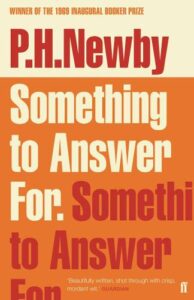
Something to Answer For by P.H. Newby
Set in 1956, Something to Answer For is narrated by Townrow, an English ex-army serviceman formerly stationed in Egypt. When he returns to Port Said after the death of a wealthy friend, he becomes entangled in a web of local politics and mafia connections, even as relations between Britain, France and Egypt worsen over the nationalisation of the Suez Canal.
The novel becomes increasingly dreamlike as Townrow is drawn into one escapade after another. At times, he appears measured and in control. At others, he is swept along on a wave of alcohol and uncertainty. It’s in this disorienting world that Townrow begins to consider whether the British government is as noble as he believes it to be – and comes to terms with his own moral ambivalence.
Is Something to Answer For worth seeking out? An emphatic yes. One of the fascinating things about this book is how contemporary it feels, how ‘Booker-y’. An unreliable narrator, death and despair, plus some of the important political events of the day, these all form part of the Booker cocktail that we’ve come to know and love. It’s beautifully written, and of its time yet also fresh and contemporary. The slight dreamlike quality may exasperate you, or it may beguile you. We recommend trying it to find out. Winner of the Booker Prize in 1969.
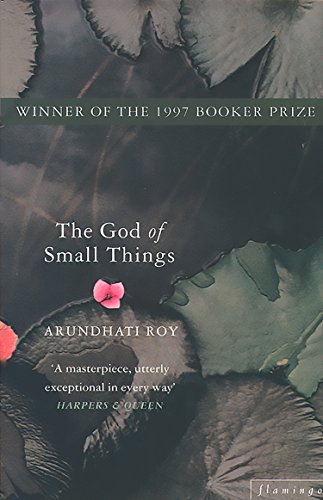
The God of Small Things, Arundhati Roy
If you missed The God of Small Things, or read it 23 years ago when it won the Booker Prize, treat yourself and read it now. It is an absolute delight, a beautifully written story of dysfunctional family life that is poetic and moving. Our narrators are the twins Rahel and Estha who live with their mother in their grandmother’s house behind the family pickle factory. Their mother has left their father, an abusive alcoholic, and returned to her family home.
The book has a complicated structure but a strong narrative arc is always there. As so often the case with Booker novels, the novel focuses on some deeply tragic events and considers important political issues, including the Indian caste system. The individual sentences are carefully composed and often very funny. Although it’s a lush, sensuous read there is also a cleverness to the way the structure holds ideas, characters and events as they whirl around to the surprising conclusion. The book was Much Imitated at the time for the author’s use of Capital Letters, but reading it again this device still seemed charming rather than annoying to us. Perfect for book club, it’s short, readable and packed with things to discuss. Winner of the 1997 Booker Prize.

Milkman by Anna Burns
Middle Sister is trying not to be noticed. Unfortunately her habit of reading while walking (so as to avoid the attention of the men who pass her on the street) singles her out as different in a place where showing any independence is dangerous. In this unnamed city in Northern Ireland neighbourhoods are divided along sectarian lines and everyone watches everyone else for any hint that they might be loyal to the ‘other side’. Now Middle Sister has attracted the attention of the Milkman, a paramilitary officer, who makes it clear she is under surveillance.
Milkman is a slow build and its language and style (no names, long sentences) takes a while to sink into. But those who stick it out are rewarded as Burns creates a world where people try to live everyday lives against a backdrop of political violence and tragedy. Hers is an insider account of the Troubles narrated by a fresh, original voice, with characters you will fall in love with, from Middle Sister herself to Maybe Boyfriend, and Wee Sisters. Milkman made for a brilliant book club read and we recommend it highly. The audiobook version, read by Brid Brennan, is also excellent. Winner of the 2018 Booker Prize.
Want to hear more? Don’t miss our episode on Milkman.
Four Booker Prize books to avoid…
We’ve shared the best of the Booker Prize. Now it’s on to the worst.
A caveat: one of the few consistent things about the Booker Prize is the controversy and debate it generates. Never a bad thing for a book club book and so though the books listed below weren’t our favourites by any stretch, we don’t discount them as good book club reads.
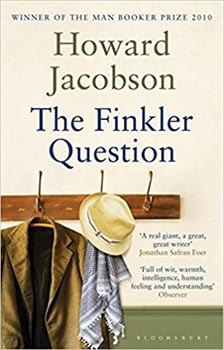
The Finkler Question by Howard Jacobson
A curious prizewinner from the 2010 Booker Prize judges, who called it ‘funny, furious, unflinching’, adding ‘this extraordinary novel shows one of our finest writers at his brilliant best.’
It’s hard to marry this description to the actual experience of reading this novel, with its unlikeable, insecure, generally miserable main character. Julian Treslove is a glass-half-empty kind of man. He never married, but has two grown-up sons with different mothers. His romantic ideal preoccupies him greatly: a beautiful woman dying in his arms. His sons, Alfredo and Rudolfo, are named after characters in tragic operas with consumptive heroines. His two main social contacts are his Jewish friends, Sam Finkler, a successful author and broadcaster on popular philosophy, and Libor Sevcik, an emigré from Prague mourning the recent loss of his wife, Malkie.
The novel explores some poignant issues: the nature of male friendship and how those friendships change over time, age, illness, loss. Unfortunately, our book club found these interesting themes to be obscured by the novel’s relentless focus on Julian and his clumsy attempts to understand Jewishness and become Jewish himself. There’s no depth to any of the characters and the relationships between them are superficial. The dialogue is excruciating, the jokes fall flat (particularly the caricatures of the women Treslove dates).
The Finkler Question caused us to question deeply the fundamental principles of The Booker Prize – what were they thinking when they awarded it to this book? And yet, there are people on Goodreads who hold it up as a masterpiece and claim to have been splitting their sides with laughter. A curiosity, then, but for us definitely one for the ‘avoid’ list. Read Kalooki Nights instead, long listed in 2006 and which we’ve heard is great! Also every interview we’ve ever heard with Howard Jacobson suggests he is a lovely man. It’s not him, it’s us! Winner of the Booker Prize in 2010.

Amsterdam by Ian McEwan
Michiko Kakutani, the New York Times book critic, called this ‘a chilling little horror story, easily read in one enjoyable gulp’. Which is odd, because Amsterdam is very much a satire in the British tradition, darkly comic and populated with egotistical, unsympathetic characters.
Two old friends, Clive and Vernon, are much struck by the undignified death of the woman whom both loved in her glamorous youth. So, they enter into a strange euthanasia pact – as you do. Each will ensure the other’s death if they become incapacitated and can’t live in dignity.
Horror story? Darkly comic satire? For Laura it fails at both, no matter which side of the Atlantic you’re on. McEwan is a fine writer, but Amsterdam is a weak, lightweight (and short!) offering from a master. Take our advice and read Atonement or Enduring Love instead, while On Chesil Beach is our pick for a great book club discussion. Winner of the Booker Prize in 2008.
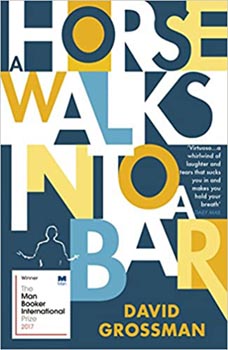
A Horse Walks Into A Bar by David Grossman
Have you ever watched a live comedy set and felt uncomfortable? Perhaps you didn’t like the jokes? Or maybe, even worse, you were embarrassed for the performer? Now imagine that feeling magnified a thousand times as it’s teased out over the course of a whole novel. It’s excruciating. And while we’re fans of other David Grossman books – To The End of The Land is a deeply moving read – A Horse Walks Into A Bar proved a struggle both for Kate’s book club, and for us when it came up on the podcast.
In many ways it’s a classic Booker Prize winner, so if you do venture in expect to be simultaneously challenged and depressed. (Translated by Jessica Cohen who did a great job – it’s not that.) Winner of the Booker International Prize in 2017.

The Famished Road by Ben Okri
We’re not saying ‘avoid’ this one. In fact, you should read it. Kate’s book club read it and found it both enjoyable and great for discussion. For many, The Famished Road may well be one of the best Booker books. But anyone familiar with the Bridget Jones books will know there’s a running joke about her meaning to read The Famished Road and instead being diverted by TV or self-help books. So, in tribute to the great Helen Fielding, and to readers everywhere who have struggled to get through something ‘worthy’, we include it here. Winner of the Booker International Prize in 1991.
Notes
If you have 12 minutes, watch this BBC interview with original Booker winner P. H. Newby who turns out to have been a charming, diffident man who struggled to think of himself as a successful author on the grounds that any writer must be all-too aware of the many great writers who have gone before them.
There’s also this little film produced by The British Library full of interesting stories about The Booker Prize.
Check out Eyes On the Prize, a books blogger reading and reviewing every Booker winner from 1969 to present day that is a favourite of ours, and who will one day be far more of an authority than us on the best Booker books. We particularly love the contemporary references, lists of vanquished foes, and life-lessons learned from each book.
The header image features Tom Maschler, the publisher who was inspired by the French Prix Goncourt to start a British version of the prize. He was proud of how the prize flourished despite a shaky start: “The Booker may be the most important thing I’ve ever done,” he told The Guardian. “It certainly had an impact and if it means people think they should occasionally read a good novel, that is something I’m very proud of.”
Over to you
What’s your favourite Booker read? Have you made any discoveries over the years? Comment below, we love to hear from you.




